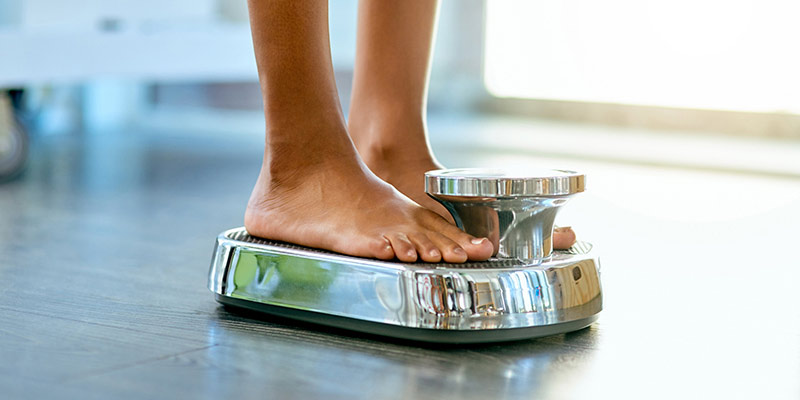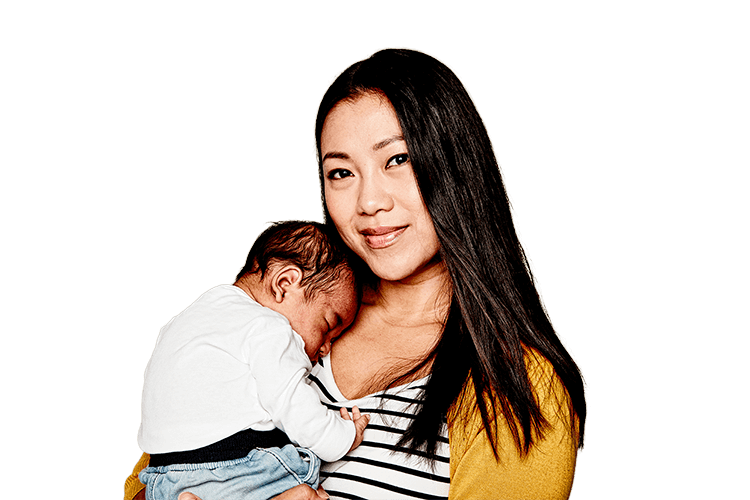Preparing for pregnancy can be exciting. However, it can also be a challenging time if you’ve been trying to fall pregnant for some time and you’re still not pregnant.
If fertility issues are preventing you from starting or growing your family there can be many factors at play, and your weight could be one of them.

How weight can impact fertility
A recent survey found that nearly two-thirds (63 per cent) of Australian adults were overweight or obese. While excess weight can cause a wide range of health problems, it can also impact fertility.
Being outside the healthy weight range can trigger hormonal imbalances and problems ovulating, which can stop the body releasing eggs to be fertilised. Obesity has also been linked to polycystic ovary syndrome (PCOS) which is also known to impact a woman's fertility.
A number of studies have demonstrated the link between weight and fertility, with some research suggesting the risk of infertility can be three times higher in obese women. One study also suggests that increased fat around the waistline, in particular, could decrease the likelihood of conceiving. For women undergoing assisted conception treatments such as IVF, research shows that obesity reduces pregnancy rates, live birth rates and increases miscarriage rates.
What about men’s health?
As we know, it takes two to tango - so it’s not just women who need to be aware of the risks.
Hormonal issues and other health conditions related to excess weight can also reduce a man’s fertility. Reaching a healthy weight at least three months before conception can help develop healthier sperm and improve the chances of conception.
What’s a healthy pregnancy weight?
Maintaining a healthy weight not only improves your chances of conceiving a child, but also having a smooth pregnancy that is free of complications. Research suggests that these risks are amplified with increasing degrees of increasing obesity during pregnancy, with the child also at increased risk of child and adult obesity.
The ideal weight for conception will vary from person to person. As a start, a simple body mass index score can help you assess if you are in the healthy range of 18.5-24.9 on the BMI scale. Your doctor can advise if you need to lose weight and help with a pregnancy diet and exercise action plan if you do.
Developing healthy habits
Getting healthy and shedding excess weight - if you aren’t in the healthy weight range - can improve your wellbeing in many ways, well beyond fertility. For those living with obesity, even a small amount of weight loss can improve your chances of conceiving. Read on for some healthy habits to get you started.
- Start with a plan: Set small but achievable goals, like a 30-minute walk a few times a week or cutting out takeaway foods on weekdays. Be realistic and add more goals over time.
- Make time to move: Exercise doesn't have to be strenuous, so look for ways to work more activity into your day. Take the stairs instead of the lift, get off public transport one stop earlier and walk, or turn a regular lunch catch-up into a lunchtime walk.
- Couple up: Encourage your partner to join you in developing healthy habits. Keep each other motivated with ideas for changing up your diet and exercise routine, and celebrate any wins along the way.
- Choose to swap: Swap sugary drinks for water, swap screen time for fresh air and swap pre-packaged junk food snacks for fresh fruit or nuts. When you’re dining out, swap fried foods for grilled or baked options.
- Lose the booze: Alcohol consumption can have a number of adverse health effects, including weight gain. For women planning a pregnancy, not drinking is the safest option, and it’s good preparation for an alcohol-free pregnancy.
Diet and lifestyle changes can help you get to a healthier weight and give you the best chance of a successful pregnancy. Get a head start by making positive changes before trying for a baby, and maintain your good habits during your pregnancy.
Need a little extra support?
Health Concierge
Whether it’s taking you a little longer to fall pregnant than you expected, or you know you’ll be needing a bit of extra help, Medibank’s Health Concierge service is there to help. You can call 1800 789 414 for support and guidance, available at no extra cost for members with residential hospital cover#.
Got a health question? 24/7 Medibank Nurse Support
Medibank health insurance members can speak to a registered nurse over the phone or online to discuss any health questions or concerns at no extra cost.~ Chat online or call 1800 644 325 24 hours a day, 7 days a week.
24/7 Medibank Mental Health Support
Medibank members with health insurance can talk with a mental health professional over the phone or online in relation to any mental health or emotional concern at no extra cost.~ Chat online or call 1800 644 325, 24 hours a day 7 days a week.
Optimal me
Medibank has partnered with Monash University to create OptimalMe, a research program designed to help mums-to-be optimise their health before they conceive. The program features tailored health and wellbeing tips and personal guidance on fitness and nutrition.
If you’re planning to have a baby in the next 12 months you may be eligible to take part. Find out more here
Looking for something else?
Visit Medibank Planning, Pregnancy and Parenting for a range of tools and advice to help you at every stage of your pregnancy journey.
Help the way you want it
Contact us
Call us on 134 190 to speak to a consultant. Alternatively, chat to us 24/7 online.
Self-service options
Login to MyMedibank or Download the MyMedibank App for self service options.
Find a specialist
Find a specialist or Member's choice hospital using our find a provider tool.

Things you should know
~ Some referred services may involve out of pocket costs and waiting periods may apply.
# Health Concierge is available to all eligible Medibank members who hold hospital cover. Excludes Overseas Visitor Health Cover, Working Visa Health Cover and Overseas Student Health Cover (OSHC). Some referred services may involve out of pocket costs.
While we hope you find this information helpful, please note that it is general in nature. It is not health advice, and is not tailored to meet your individual health needs. You should always consult a trusted health professional before making decisions about your health care. While we have prepared the information carefully, we can’t guarantee that it is accurate, complete or up-to-date. And while we may mention goods or services provided by others, we aren’t specifically endorsing them and can’t accept responsibility for them. For these reasons we are unable to accept responsibility for any loss that may be sustained from acting on this information (subject to applicable consumer guarantees).